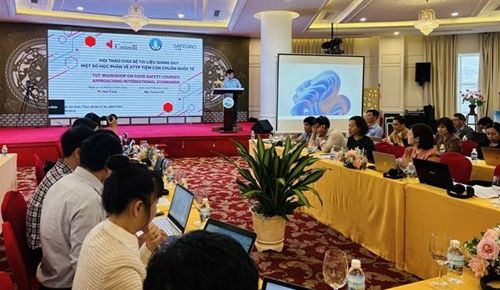The training, which is taking place from February 21 until February 23, is designed to equip lecturers in Vietnam with the skills and knowledge to deliver courses in an undergraduate food safety curriculum and a graduate food certificate program following international standards.
    |
 |
|
Food safety lecturers attending the workshop are expected to apply the internationally standardized curriculum at their universities. |
This is part of the Safe Food for Growth Project (SAFEGRO) funded by Global Affairs Canada and implemented by some Vietnamese ministries and agencies.
Do Thanh Lam, SAFEGRO project director, said enhancing the quality of training and workforce development in food safety plays a particularly important role in the construction and implementation of food safety regulations and policies based on scientific evidence and risk assessment.
One of SAFEGRO’s focuses is to support the improvement of food safety training through the development of modern teaching materials approaching international standards for university and short-term training courses at businesses and food safety management agencies, he said.
With the participation of leading national and international experts, the SAFEGRO Project has developed teaching materials for 10 specialized modules on food safety, focusing on important areas such as risk analysis, food inspection, testing and traceability, food factory hygiene design, food safety management systems, quality assurance and food safety culture.
“This set of materials not only helps update the latest scientific knowledge but is also highly practical, supports lecturers in teaching and improves the capacity of professional staff,” he said.
Professor Lawrence Goodridge, Director of Canadian Research Institute for Food Safety at the University of Guelph and one of the workshop’s trainers, said Canada does not have a national curriculum for food safety on which everybody agrees. He praised SAFEGRO’s efforts in developing a food safety curriculum which he calls “a modern way of an input to the future of how food safety education should be done.”
He noted that one of the workshop’s major objectives is to ensure that the course material aligns with international food safety standards.
“These standards are always changing. There will be needs to update the course material from time to time to develop interactive and engaging teaching methodologies,” he said.
Over the three-day course, participants are expected to share their practical teaching experience and propose solutions to improve teaching effectiveness and improve lecture content to suit the actual conditions of Vietnam.
On the last day of the workshop, lecturers are expected to come up with a specific action plan to apply these modules at their universities this year.
Source: VNA